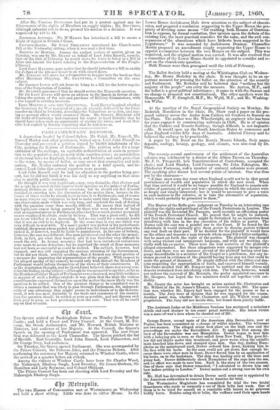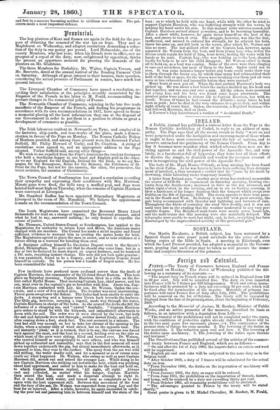t Rittrupnlio.
The two Houses of Convocation met at Westminster on 'Wednesday and held a short sitting. Little was done in either House. In the Lower House Archdeacon Halo drew attention to the subject of church- rates, and proposed a resolution suggesting to the Upper House the pro- priety of devising some means "for enabling both Houses of Convoca- tion to express, by formal resolution, ther opinion upon the defects of the existing law, the most practical remedies for the same, and the evil con- sequences of the alterations which have hitherto been suggested in the Legislature." It was seconded by Archdeacon Denison. Chancellor Martin proposed an amendment simply requesting the Upper House to appoint a committee between the two Houses on the subject. This was negatived, and the original motion was carried. It was also resolved that a committee of the Lower House should be appointed to consider and re- port on the church-rate question. Both Houses were then prorogued until the 14th of February.
The Ballot Society held a meting at the Whittington Club on Wednes- day, Mr. Henry Berkeley- in the chair. It was thought to be an op- portune moment for pressing the ballot on the attention of the country and Parliament. Mr. Berkeley said he believed that "nothing but the majesty of the people" can carry the measure. Mr. Ayrton, M.P., said the ballot is a great political inheritance ; it came in with the Saxons and no change is proposed not constitutional. The other speakers were the Honourable W. F. Campbell, M.P., Mr. Wyld, M.P., and Mr. Washing- ton Wilks.
At the meeting of the Royal Geographical Society on Monday, Sir Roderick Murchison in the chair, Dr, Shaw read a paper on the pro- posed railway across the Andes from Caldera viii Cordova to Rosario on the Plata. The author was Mr. Wheelwright, an engineer who has been for years engaged in constructing railways in Chili. Ho is of opinion that the Caldera and Rosario Railway, though difficult, is not impracti- cable. It would open up the South American States to commerce and place England within fifty days of Australia. Admiral Fitzroy said he believed the railway to be practicable. A paper by Dr. Buist on the Kooria Mooria Islands, their guano deposits, zoology, botany, geology, and climate, was also read by Dr. Shaw.
The seventy-second anniversary of the settlement of the Australian colonies was celebrated by a dinner at the Albion Tavern on Thursday. Mr. J. G. Fitzgerald, late Superintendent of Canterbury, occupied the chair; and Lord Stanley, Lord Carnarvon, Sir John Pakington, Mr. Chichester Fortescue, and a number of eminent colonists were present. The speaking after dinner had several points of interest. One was thus put by the chairman-
" A time must some day come when England would not be in that proud preeminence of wealth and population in which she now stood. When that time arrived it would be no longer possible for England to remain sole arbiter of questions of peace and war—questions in which the colonies were so deeply and vitally interested ; but it would be necessary to give a voice in such matters to the colonies, or to take the alternative of separation, which would probably be presented to them."
The Master of the Rolls gave judgment on Tuesday in an interesting case affecting the rights and privileges of the French Protestants in London. The plaintiff was the Reverend Mr. Daugars, until recently an officiating pastor of the French Protestant Church. He prayed that he might be restored, and that the elders and deacons might be restrained by an injunction from interfering. with him in the due execution of his duties as pastor. The Master said the case was a painful one to the Court. If he found for the defendants it would virtually give them power to dismiss pastors without any real fault on their part. If he decided for the plaintiff it would force on the elders and deacons a man towards whom many felt a bitter antipathy. But he must set forth the right of the parties. The plaintiff was charged with using violent and intemperate language, and with not working cor- dially with his co-pastor. These were the real materies of the plaintiff's alleged misconduct. But these allegations were supported by meagre evi- dence, and there was no instance proved of the plaintiff having used lan- guage discreditable to a minister of the Gospel or a gentleman, nor any in- stance proved in evidence of the plaintiff having done any net that could be made the ground of dismissaL He simply differed with the elders and dea- cons respecting the appropriation of funds, and expressed himself warmly. The Court decided that Mr. Dangers must be restored and the elders and deacons restrained from interfering with him. The Court, however, would not enforce the removal of Mr. Marzials, the pastor appointed successor to Mr. Daugars, but hoped the two ministers would act together with cor- diality.
Mr. Emery the actor has brought an action against Mr. Chatterton and Mr. Willett of the St. James's Theatre, to recover salary, 801. The ques- tion was, whether Mr. Emery had been engaged for the season or for a month. The Jury wore of opinion that he was engaged for the season. Another point was, whether Mr. Chatterton and Mr. Willett werejoint proprietors. The Jury did not decide this, but found them jointly liable.
The Assistant Judge at the Middlesex Sessions has sentenced a notorious skittle and card sharper to ten years' penal servitude. His latest victim was a man-of-war's man whom he cheated out of 201.
George Dower, second mate of the American ship Devonshire, now at Poplar, has been committed on a charge of wilful murder. The witnesses are two seamen. The alleged crime took place on the high seas and the proceedings are under the Extradition Act. It appears that among the crew of the Devonshire was one Humphries. Dower began to beat him with a belaying. pin as soon as they sailed from New York. The poor fel- low did not thrive under this treatment, and grew worse when the amiable mate knocked him down and stamped upon him. One day, finding Hum- phries on the maintopsail yard, Dower ordered him down, kicking him in the face with his boots. As the man could not get down 'fast enough be- cause there were other men in front, Dower forced him by an application of his boots, on to the baokstays. The ship was heeling over at the time and going fast. Dower deliberately shook Humphries off the rope into the sea, and no effort was made to save him. Such is the story of the two seamen. One of them says that Dower remarked, "I calculated to drown him any how before getting to London." Dower makes out a strong case on his own side.
Mr. Hall has determined to detain Dower until some one is appointed by the American authorities to remove him to America for trial.
The Westminster Magistrate has committed for trial the two brutal Guardsmen who made so unmanly a use of their belts last week. One of them is to be tried for assault on a constable with intent to do grievous bodily harm. Besides using their belts, the ruffians used their open hands and feet in a manner becoming neither to civilians nor soldiers. The pri- soners made a most impudent defence.



























 Previous page
Previous page